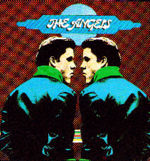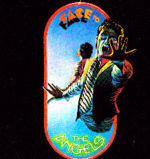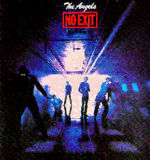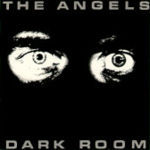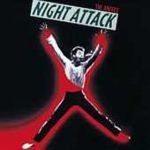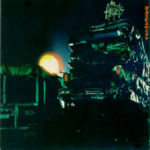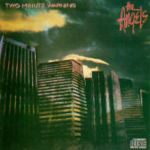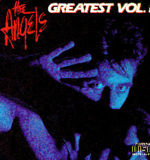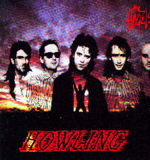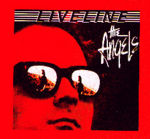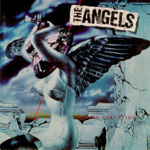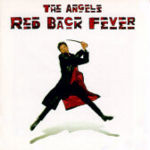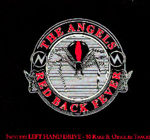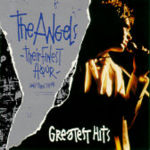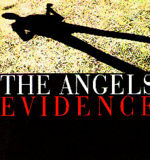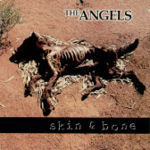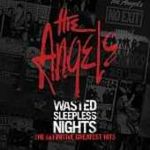The Angels
The Angels | |
|---|---|
| Also known as | The Keystone Angels, Angel City |
| Origin | Adelaide, SA |
| Genres | Hard rock |
| Years active | 1971 – 2000, 2006 - present |
| Labels | Alberts, Epic, Mushroom, Shock |
| Associated acts | The Party Boys, Skyhooks, GANGgajang, Finch, Temple Gods, Jimmy Barnes, Red Phoenix, Choirboys, Black Cat Moan, Strawberry Blonde, The Stetsons, Catfish, The Numbers |
| Website | http://www.theangelsband.net |
| Members | Chris Bailey, Graham Bidstrup, Rick Brewster, John Brewster, Dave Gleeson |
| Past members | Doc Neeson, Brent Eccles, Jim Hilbun, James Morley, Peter Christopoulos, Bob Spencer |
Band members
- Currrent line-up
- Chris Bailey (bass)
- Graham "Buzz Throckman" Bidstrup (drums)
- Rick Brewster (guitar)
- John Brewster (guitar)
- Dave Gleeson (vocals)
- Former members
- Doc Neeson (vocals) (1971 - 2011)
- James Morley (bass) (1990 - 1993)
- Bob Spencer (guitar) (1985 - 1993)
- Jim Hilbun (bass, sax) (1982 - 1990, 1994 - 2000)
- Brent Eccles (drums) (1981 - 2000)
- Charlie King (Peter Christopolous) (drums) (1975 - 1976)
Band information
The Angels was one of Australia's greatest bands for two decades from the mid-70s. The group mixed a punkish proto-metal musical style grounded in boogie-based hard rock with an energetic and partly theatrical live performance which pushed them to the forefront of the local music scene and eventually developed a strong though small international following that saw their material covered by Great White and name-checked by groups like Guns N' Roses. Since 2000 when Doc Neeson was forced to leave after sustaining near-fatal injuries in a car accident, The Angels has only nominally existed as various groupings of former members playing and touring under different names including Members of the Angels, The Original Angels Band and Doc Neeson's Angels. A court injunction made effective from August 2007 restricted all former members of the band from working under the name The Angels, however by April 2008 The Angels had reformed once again.
The band was formed as the Moonshine Jug and String Band in late 1970 by John and Rick Brewster in Adelaide, with Neeson joining early the next year. They played coffee houses and university campuses and an EP from 1973 peaked at No. 5 on the local music chart. In 1975 the band began playing 50s rock n' roll and changed its name to the Keystone Angels. The Keystone Angels featured Neeson on bass, John Brewster on lead vocals and drummer Charlie King, a pseudonym for Peter Christodopolous. This version of the band toured as Chuck Berry's backing group and released a single.
AC/DC's Malcolm Young recommended them to Alberts and after becoming The Angels the single "Am I Ever Gonna See Your Face Again" was released in 1976. Christodopolous was replaced by Buzz Throckman (aka Graham Bidstrup) and Chris Bailey joined on bass to allow Neeson to take over as vocalist. Neeson's wildly extroverted style led to The Angels becoming a fearsome live act with a reputation difficult to surpass.
In August 1977, the band's first album appeared but was only moderately successful. The follow-up, Face to Face was released a year later and turned them into one of Australia's biggest bands. Face to Face charted for 18 months and gave them their first hit single, "Take A Long Line". At the end of the year The Angels toured with David Bowie. With the ascendancy of Cold Chisel and Midnight Oil still several years away and others like Sherbet and Skyhooks falling apart, The Angels was now the highest-paid live band in the country. With Face to Face still on the albums charts, No Exit debuted at No. 8 when it was released in mid-1979 and The Angels finished the decade with a performance on the steps of the Sydney Opera House on New Year's Eve in front of an estimated 100,000 people. The night was marred with drunken violence; Neeson was hit in the head by an object and Bailey was knocked unconscious with a beer bottle. The Opera House steps were not used as a venue for a major open-air concert again until Crowded House played their farewell show there in 1996.
In 1980 The Angels signed with CBS Records for worldwide release. To avoid legal wrangles with the American glam band Angel, the name Angel City was adopted for overseas release and touring; a compilation of Face to Face and No Exit was then released under the Face to Face name. The band's next Australian album was Dark Room, a No. 6 hit and another huge seller during an epic year for Australian music albums that included AC/DC's Back in Black, True Colours by Split Enz, Cold Chisel's East and The Boys Light Up by Australian Crawl.
Early in 1981, Bidstrup left The Angels and was replaced by Brent Eccles as the band began working on the Night Attack album. Geared for US audiences, it refined the band's boogie-fed style into a more metal direction. Bidstrup joined The Party Boys in 1983 before forming GANGgajang in 1985.
American Jim Hilbun replaced Chris Bailey during rehearsals for the group's 1982 US tour. With his melodic vocals and saxophone-playing and a dynamic live presence almost equal to Neeson's, Hilbun's impact on The Angels was immediate. The band's next single, "Stand Up", credited to Hilbun alone, was their first top 40 single success in more than two years. Watch the Red saw The Angels further experimenting with tracks like "The Zoo" built around a long studio jam session and "Eat City" with its tortured sax solo.
Two Minute Warning reached No. 2 on the Australian charts, the band's highest peak to that time but mishandling by their American label meant it was a failure elsewhere. Shortly after it was released, John Brewster was fired. He then joined the latest version of The Party Boys with Alan Lancaster of Status Quo and Angry Anderson from Rose Tattoo. After Anderson left to go solo, John "Swanee" Swan joined the group and they recorded a No. 1 single and album and later toured with AC/DC. Brewster left The Party Boys in late 1989 and eventually rejoined The Angels in 1994.
Bob Spencer, a member of the 70s hard rock act Finch and Red Symons' replacement in Skyhooks, replaced Brewster and The Angels signed to Mushroom for their next album, Howling. Howling was a more melodic effort in comparison to the previous three with keyboard contributions from Eddie Rayner of Split Enz providing some smoothness to the sound. The album spawned a raft of hits including the Animals' cover "We Gotta Get Outta This Place", at No. 6 The Angels' highest charting single.
If The Angels showed the occasional weakness in the studio, live on stage they proved themselves to be virtually unbeatable. Few bands could stand alongside The Angels in the live situation and the double live album, Liveline displayed the band's best colours. Much of it was recorded at Bankstown RSL in March 1987 but several tracks were lifted from earlier live shows, including the opener "Coming Down" that was taken from a never-released recording of their headlining performance at the 1983 Narara rock festival. Livelive has been subsequently re-released twice, first by Shock in 1999 as a remastered special edition featuring an extra 10 tracks. This edition was then re-issued once more by Liberation in 2006.
Liveline was followed by a massive Australian tour that featured The Angels playing for over two hours every night. Late the next year the band was personally selected by Guns N' Roses as the major support for their first Australian tour. Recording then began in Tennessee on the double album Beyond Salvation. Hilbun left during the sessions and was replaced by James Morley. Released in mid-1990, Beyond Salvation reached No. 1 on the chart with three of its five singles all charting. The "Dogs Are Talking" single featured demo tracks by The Hurricanes, the Desert Cats and Baby Animals on the flip.
The follow-up album Red Back Fever featured several tracks left over from the Beyond Salvation sessions and while it made the Top 20 it disappeared quickly. The Mott the Hoople cover "Once Bitten Twice Shy" was forgettable but "Tear Me Apart" featured as the theme for a Federal government campaign targetting alcohol-related violence. At the end of a two-year tour, Spencer and Morley left the Angels and the band seemed set to break up. However, the band was approached to play a show for the Hell's Angels in New Zealand in late 1994 so John Brewster and Jim Hilbun rejoined and The Angels continued. The Barbed Wire Ball tour in 1995 featured The Angels touring with The Screaming Jets and The Poor, after which Neeson announced during a radio interview that he would leave the band in mid-1996. This did not occur however and the acoustic-driven Lounge Lizard tour the following teamed The Angels with Angry Anderson and Ross Wilson.
The group's next album Skin and Bone was released on Shock in March 1998 and proceeded to stun almost everyone when it received an ARIA Award nomination for Album of the Year. Late in the year The Angels were inducted into the ARIA Hall of Fame and played at Mushroom Records' 25th anniversary concert. As they had twenty years before, The Angels saw out the decade with a New Year's Eve performance, this time the Darwin Millennium Concert. Shortly afterward, a car carrying Doc Neeson was hit by a truck and destroyed. Neeson escaped but suffered life-threatening injuries to his neck and spine and was confined to a wheelchair. He was unexpected to make a satisfactory recovery and as a result The Angels came to an end, with the group's remaining members apparently agreeing with Neeson to no longer perform under the name "The Angels" in the future without his involvement. In early 2001, Members of The Angels (featuring Hilbun on vocals plus Brewster, Brewster, Bidstrup and Bailey) performed at a benefit show for Ted Mulry.
Shock released a 4-CD boxed set in 2002 that included Dark Room, Night Attack, Watch the Red and Two Minute Warning and the Brewsters approached Neeson about reforming the band with Bidstrup and Bailey. However, the singer refused so the group toured under the name The Original Angels Band with John Brewster on vocals.
Neeson finally returned to music in 2005 with his new band Red Phoenix that featured Jim Hilbun and David Lowy--the son of Westfield billionaire Frank Lowy--on guitar. An album and EP was eleased and a small number of shows were played but Neeson's injuries restricted further work and the band seems to have since ended. The Original Angels Band had, in the meantime, recorded the DVD title Live at the Basement. It was released in late 2006 under the moniker The Angels, in breach of the agreement from 2000. During 2007, the group also released the EP "Ivory Stairs" indepedently, a re-working of one of their oldest songs. By mid-2007, Neeson, Hilbun, Lowy, ex-Baby Animals guitarist Dave Leslie and drummer Paul Wheeler were using the name Doc Neeson's Angels in the lead-up to a performance at the Countdown Spectacular. Neeson instigated legal proceedings to prevent use of the name The Angels; an injunction was handed down in late August, 2007. Both bands continued to tour and perform however. In April 2008 it was announced that the Face to Face line-up of Neeson, Brewster, Brewster, Bailey and Bidstrup had reformed for a tour to celebrate the album's 30th anniversary.
Discography
Albums:
| 1977 | The Angels | Alberts | |
| 1978 | Face to Face | Alberts | |
| 1979 | No Exit | Alberts | |
| 1980 | Dark Room | Alberts | |
| 1981 | The Angels Greatest | Alberts | |
| 1981 | Night Attack | Epic | |
| 1983 | Watch the Red | Epic | |
| 1985 | Two Minute Warning | Epic | |
| 1986 | Greatest Vol 2 | Epic | |
| 1986 | Howling | Mushroom | |
| 1988 | Liveline | Mushroom | |
| 1990 | Beyond Salvation | Mushroom | |
| 1991 | Red Back Fever | Mushroom | |
| 1992 | Left Hand Drive | Mushroom | |
| 1992 | Their Finest Hour... and Then Some | Alberts | |
| 1994 | Evidence | Mushroom | |
| 1997 | Skin and Bone | Shock | |
| 2006 | Wasted Sleepless Nights - The Definitive Greatest Hits | Liberation |
Singles:
| 1976 | Am I Ever Gonna See Your Face Again | Alberts | |
| 1977 | You're a Lady Now | Alberts | |
| 1978 | Coming Down | Alberts | |
| 1978 | Straitjacket | Alberts | |
| 1978 | Take a Long Line | Alberts | |
| 1978 | After the Rain | Alberts | |
| 1979 | Shadow Boxer | Alberts | |
| 1980 | No Secrets | Epic | |
| 1980 | Poor Baby | Epic | |
| 1980 | Face the Day | Epic | |
| 1981 | Night Attack | Epic | |
| 1981 | Into the Heat | Epic | |
| 1982 | Living on the Outside | Epic | |
| 1982 | Stand Up | Epic | |
| 1983 | Eat City | Epic | |
| 1983 | Live Lady Live | Epic | |
| 1983 | Is That You? | Epic | |
| 1984 | Between the Eyes | Epic | |
| 1985 | Look the Other Way | Epic | |
| 1985 | Sticky Little Bitch | Epic | |
| 1985 | Underground | Epic | |
| 1986 | Nature of the Beast | Mushroom | |
| 1986 | Don't Waste My Time | Mushroom | |
| 1987 | We Gotta Get Outta This Place | Mushroom | |
| 1987 | Can't Take Anymore | Mushroom | |
| 1988 | Am I Ever Gonna See Your Face Again | Mushroom | |
| 1988 | Love Takes Care/Be With You | Mushroom | |
| 1988 | Finger on the Trigger | Mushroom | |
| 1990 | Let the Night Roll On | Mushroom | |
| 1990 | Dogs are Talking | Mushroom | |
| 1990 | Backstreet Pick Up | Mushroom | |
| 1990 | Rhythm Rude Girl | Mushroom | |
| 1991 | Bleeding With the Times | Mushroom | |
| 1991 | Some of that Love | Mushroom | |
| 1991 | Once Bitten Twice Shy | Mushroom | |
| 1992 | Tear Me Apart | Mushroom | |
| 1994 | Don't Need Mercy | Mushroom | |
| 1995 | Turn it On | Mushroom | |
| 1996 | Call That Living | Dump | |
| 1997 | Caught in the Night | Shock | |
| 1998 | Northwest Highway | Shock | |
| 1998 | My Light Will Shine | Shock |
EPs:
| 1978 | Tour EP | Alberts | |
| 1979 | Out of the Blue | Alberts | |
| 1981 | Never So Live | Epic | |
| 1995 | Hard Evidence Tour | Mushroom | |
| 2007 | Ivory Stairs | self release |
